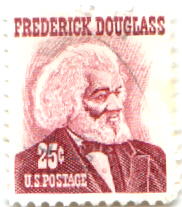FRtR > Outlines > American Literature > Democratic Origins and Revolutionary Writers, 1776-1820: Frederick Douglass (1817-1895)
An Outline of American Literature
by Kathryn VanSpanckeren
The Romantic Period, 1820-1860: Fiction: Frederick Douglass (1817-1895)
*** Index ***
 The most famous black American anti-lavery leader and orator of
the era, Frederick Douglass was born a slave on a Maryland
plantation. It was his good fortune to be sent to relatively
liberal Baltimore as a young man, where he learned to read and
write. Escaping to Massachusetts in 1838, at age 21, Douglass was
helped by abolitionist editor William Lloyd Garrison and began to
lecture for anti-lavery societies.
The most famous black American anti-lavery leader and orator of
the era, Frederick Douglass was born a slave on a Maryland
plantation. It was his good fortune to be sent to relatively
liberal Baltimore as a young man, where he learned to read and
write. Escaping to Massachusetts in 1838, at age 21, Douglass was
helped by abolitionist editor William Lloyd Garrison and began to
lecture for anti-lavery societies.
In 1845, he published his Narrative of the Life of Frederick
Douglass, An American Slave (second version 1855, revised in
1892), the best and most popular of many "slave narratives."
Often dictated by illiterate blacks to white abolitionists and
used as propaganda, these slave narratives were well-known in the
years just before the Civil War. Douglass's narrative is vivid
and highly literate, and it gives unique insights into the
mentality of slavery and the agony that institution caused among
blacks.
The slave narrative was the first black literary prose genre in
the United States. It helped blacks in the difficult task of
establishing an African-American identity in white America, and
it has continued to exert an important influence on black
fictional techniques and themes throughout the 20th century. The
search for identity, anger against discrimination, and sense of
living an invisible, hunted, underground life unacknowledged by
the white majority have recurred in the works of such 20th-
century black American authors as Richard Wright, James Baldwin,
Ralph Ellison, and Toni Morrison.
*** Index ***
 The most famous black American anti-lavery leader and orator of
the era, Frederick Douglass was born a slave on a Maryland
plantation. It was his good fortune to be sent to relatively
liberal Baltimore as a young man, where he learned to read and
write. Escaping to Massachusetts in 1838, at age 21, Douglass was
helped by abolitionist editor William Lloyd Garrison and began to
lecture for anti-lavery societies.
The most famous black American anti-lavery leader and orator of
the era, Frederick Douglass was born a slave on a Maryland
plantation. It was his good fortune to be sent to relatively
liberal Baltimore as a young man, where he learned to read and
write. Escaping to Massachusetts in 1838, at age 21, Douglass was
helped by abolitionist editor William Lloyd Garrison and began to
lecture for anti-lavery societies.